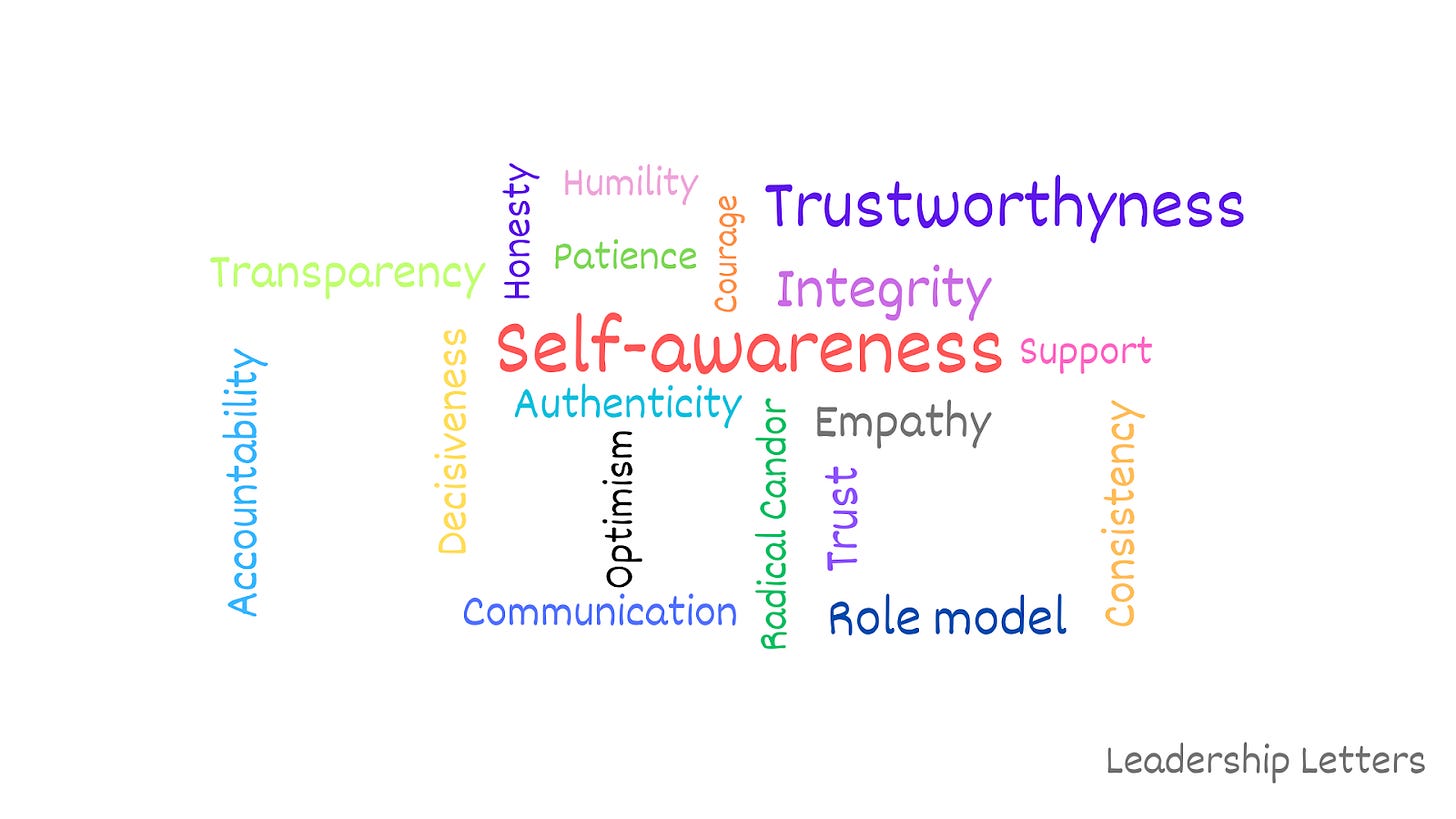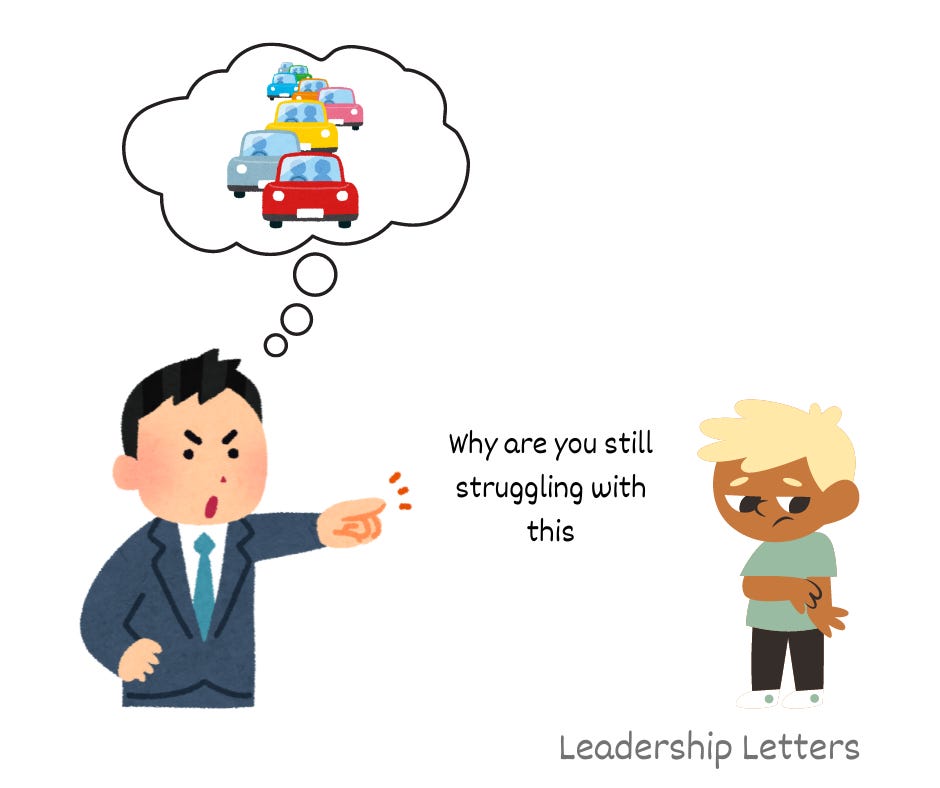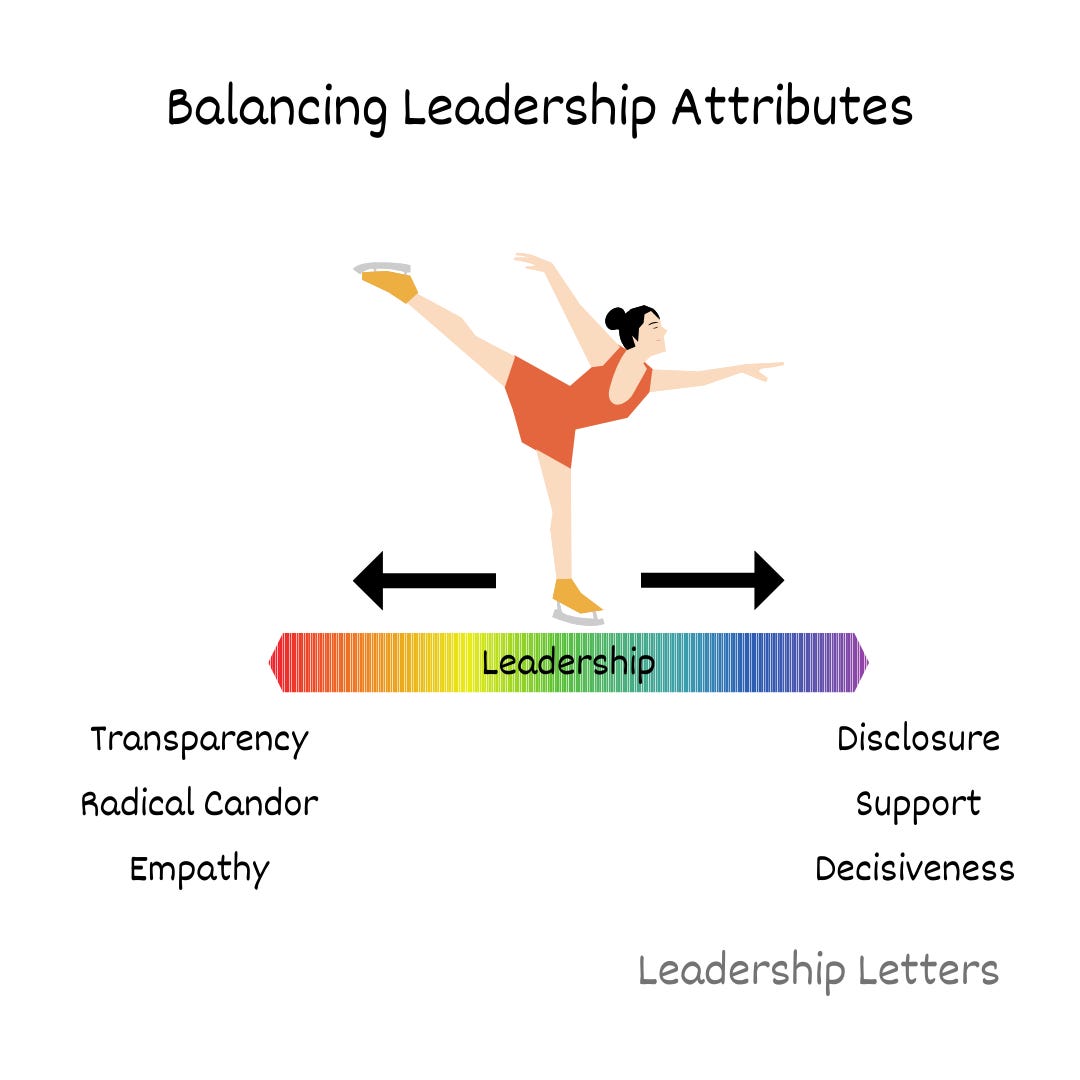3 Questions to Ask Yourself As A Leader
Understand your strengths, weaknesses, and blind spots for better leadership
👋 Hi, this is Akash with this week’s newsletter. I write about leadership in software engineering. Thank you for your readership.
This week I’m sharing 3 simple questions to ask yourself to be more self-aware. Hope you enjoy this edition!
Are you tougher on your team than yourself?
Do you think about how others see what you say?
Let’s take an example.
Transparency is a core leadership value.
But did you know that I almost destroyed my team's motivation by being too transparent?
Self-awareness is at the center of it all. I’ve made many mistakes by not paying attention to how others might see my actions. A leader’s actions have a deep impact on individuals. You should choose them carefully.
In this article, we will uncover my mistakes and how you can learn from them to be a better leader.
You’ll be able to apply these lessons and improve your 360° communication.
There’s a lot to cover, let’s get started!
💡 What makes Self-Awareness so important?
Self-awareness is like having an internal mirror to help you see yourself clearly. The purpose is to understand your:
Own thoughts
Feelings and behaviors
Strengths and weaknesses
Let’s say you had bad traffic on your way to the office, you’re frustrated. But is it okay to be extra direct to your team that day?
We’re all humans and how we feel has a lot to do with how we communicate.
Self-awareness helps you be more mindful and be consistent with your communication.
Self-aware leaders are better at:
Navigating challenges and leaving a lasting impact
Inspiring their team and getting things done by encouraging growth
Setting boundaries at work and advocating for it
… and many more
Enough on why it’s important. Let’s explore how you can implement some changes to be more self-aware.
❓🤔 3 Questions to Ask Yourself
Have you ever walked away from a conversation feeling satisfied, only to realize later that it did more harm than good?
When I started my leadership journey, self-awareness was not at the top of my list. Authenticity was. I thought, if I can be trustworthy and authentic, others will understand my intentions.
One time I got feedback that I reassigned some bug without properly communicating. Similar things happened before, but I could never connect them together. Luckily at the time, I was doing my leadership course at Harvard Business School. That week we were talking about self-awareness; and it all clicked.
When I assigned the bug, I assumed the person would connect the dots. This was in their area of ownership. I thought I was being respectful of boundaries. But, it was perceived as an exercise of authority. Looking back, it was completely my mistake. At the time, there were some other reorg conversations going on. I didn’t consider how that could make them feel that way.
Could I have done anything better? Of course. Here’s 3 questions to ask yourself before acting as a leader.
1) Would you want to work for yourself?
Personally I’ve always appreciated honest conversations. Being a straight shooter is good, but are you thinking of how the other person will feel? Forget the other person, if you’re treated the same way, how’d you feel?
In the earlier example, what I meant was not what was perceived. You can do better,
Take a moment before responding. This will buy you time for self-reflection.
Notice your body language. Are you tense? Indirect cues impact how your words are received.
Is there a way to say this more clearly and kindly?
If I had considered these, my actions would’ve been better. Putting aside my assumption, I’d have sent them a simple note before assigning the work.
2) Are you evaluating your actions periodically?
I used to treat my mistakes as individual interactions. I learned from previous ones, but I’d make new mistakes. What I missed was identifying the underlying problem, self-awareness.
You can avoid making the same mistakes, if you:
Create a safe space for honest feedback. Ask your team how they felt.
Replay your interaction after important conversations. What were your word choices? Tone?
Seek feedback from trusted colleagues.
Investing in regularly checking how others see you is the best thing you can do today. If I had done this earlier, I'd have noticed the pattern much sooner.
3) Do you balance your core leadership strengths?
One of my core leadership strengths is “authenticity”. My default strategy was to be completely transparent. It was working well for the most part. But one time, I heard some concerning changes in the organization from up. As I shared the news with the team, everyone panicked.
At that moment, I knew that I messed up. Next few weeks went by doing damage control. My mistake was not balancing transparency with limited disclosure. Leadership skills are generally on a spectrum. A leader tries to balance on this spectrum depending on the situation.
Inquire about your own leadership strengths and weaknesses. You’ll be able to identify how some of your strengths need balancing. Think about the second order consequences (There’s a great article from , give it a read).
🌟 🔍 Parting Thoughts
The core idea behind self-awareness is understanding how others perceive you. That was the theme of the entire post. Remember, you want to treat people how you want to be treated. I still make a lot of mistakes; they’re unavoidable. The key is to continuously iterate and improve.
If you want to start investing in self-awareness today, try to:
Slow down and think: Before speaking in meetings, take a breath and ask yourself, "Is this necessary? Is this helpful?"
Reframe negatives: Focus on solutions, not just problems. Rephrase "We can't" into "How might we...?"
Be aware of your non-verbal cues: Acknowledge your emotions. Ask yourself, “Am I being a little too direct today?” (check out this article from
)
If you remember only one thing, remember to ask yourself “Would I work for myself?”. That is the most important question for self-reflection.
What self-prompt do you use for self-awareness? Share it in the comment!
🐦🔥 This Week’s Favorites
Story on Junior -> Senior in 2 years from
bySaying “NO” from
byConflict resolution (one of my favorite topics) from
byInteresting take on remote work from
by
👋 💬 Get In Touch
Want to chat? Find me on LinkedIn.
If you want me to cover a particular area of leadership, you can reach out directly on akash@chromium.org.
If you enjoyed this content, please 🔁 share it with friends and consider 🔔 subscribing if you haven’t already. Your 💙 response really motivates me to keep going.







Love the images
This hit harder than I expected. Especially the question about “what version of myself am I protecting?” — I see this all the time in high performers who’ve built their identity on control, and slowly lost touch with what they actually need.
Sometimes, leadership becomes a performance.
And undoing that takes more courage than most people realise.
Thanks for writing this — quietly powerful.